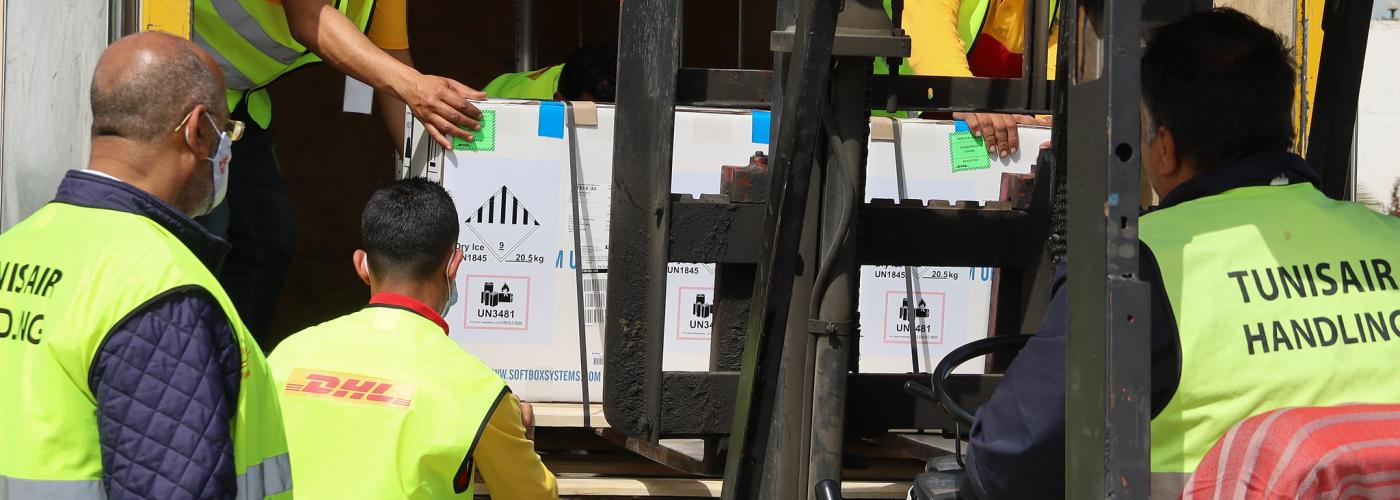Tunisian Business Proves That Global Tech Companies Don’t Just Grow in Silicon Valley
Image

By Lauren Yang, USAID INVEST Communications
People who join tech company Fulfillment Bridge rarely leave. Since day one, CEO and founder Kais Khadhraoui has established a flexible company culture, only requiring employees to work from Fulfillment Bridge’s office three days a week. Mondays and Fridays are free days, allowing team members to work from home, take short trips to see parents, or even do their work lying on a beach.
“Before starting Fulfillment Bridge, I was a part of a Fortune 500 company doing business with teams overseas, and I realized that you don’t need to maintain tight supervision to get the job done,” Khadhraoui said. “You need to motivate your people, give them the validation they are looking for, hear their contributions when it comes to decision-making, and keep them informed of what’s going on. That’s all you need to motivate staff. You don’t need to put them in an office.”
Fulfillment Bridge is a global e-commerce logistics solution that integrates all the pieces that online sellers need to fulfill orders: warehousing, freight forwarding, shipping, inventory management, insurance, and more. Between the company’s forward-thinking work culture and an explosion of growth in e-commerce (compounded by COVID-19), one might assume that Fulfillment Bridge belongs to Silicon Valley’s cohort of burgeoning tech startups. However, its offices sit not in San Francisco — or Austin, or Boston, or Denver — but Tunisia, where Kais and the bulk of his employees hail from.
Companies like Fulfillment Bridge find themselves in a challenging position: were they located elsewhere, they would likely have a much easier time raising the capital they need to grow. Investors tend to shy away from unfamiliar markets like Tunisia, where political and macroeconomic instability, perceived regulatory complications, and nascent investment opportunities increase perceptions of risk. However, Tunisia also struggles with persistently high unemployment rates, especially among young people. Demand for jobs far outpaces the supply, compromising potential economic growth.
Small and medium enterprises (SMEs) may hold the key to addressing this challenge, as they contribute the lion’s share of jobs — more than two-thirds — in developing and emerging countries. In early 2020, the USAID Tunisia Mission partnered with USAID INVEST and CrossBoundary to identify and implement ways to increase the flow of capital to high-potential Tunisian businesses impacted by the current economic downturn. INVEST and CrossBoundary facilitated over 100 meetings via the Tunisia Prosper Africa Conference’s “deal room” to identify high-priority investment opportunities — including Fulfillment Bridge. This work advances the goals of the Prosper Africa initiative to increase two-way trade and investment between African nations and the United States. Over the course of the next year, USAID, INVEST, and CrossBoundary provided Fulfillment Bridge with transaction advisory support, helping the company to successfully raise $750,000 in capital.
The Road to Raising Capital
For USAID and its partners, Fulfillment Bridge presented two particularly attractive job creation opportunities: as an enabler of other SMEs, its growth could have a multiplier effect, spurring job creation not only for the company but its clients as well. Tunisia’s high unemployment rate and small consumer market mean the domestic population has limited purchasing power; outsized economic and SME growth will require increasing international sales and exports. Khadhraoui also had plans to use a capital raise to double the size of the team, creating high-quality, highly skilled jobs in Tunisia for developers, sales and marketing agents, and senior management. He and his team had already decided to begin approaching investors, knowing that the right one could help Fulfillment Bridge achieve in one year what would normally take five or six. But they needed help.
“Being a start-up, we’re doing a lot of ‘one-man-show’ work. We’re split all over the place: scaling the team, doing business, prospecting, talking to investors, et cetera,” Khadhraoui said. “We cannot have all those hats or expertise at once, and we cannot afford that $100,000 CFO who can get your outreach document to the point to impress investors. That’s where CrossBoundary came to fill a huge gap for us.”
CrossBoundary utilized the Fulfillment Bridge team’s innate knowledge of the business to create pitch decks, financial models, and other materials to appeal to investors and portray them “not as amateurs, but rather as professional entrepreneurs.” Given the limited size of the Tunisian investment landscape, CrossBoundary focused on crowding in two types of non-traditional investors: MENA-focused investors who overlook Tunisia in favor of larger markets, and Sub-Saharan investors who don’t typically consider opportunities in North Africa.
“North Africa and MENA-focused funds are often primarily interested in the larger markets in the region, like Egypt, because of the inherent size of the pipeline of investable opportunities, as well as the size of the local serviceable market. As such, they often don’t have the intention or capacity to dedicate resources to look at Tunisia, because in comparison, it looks like a small market that would take too much effort to learn about and invest in,” said Kirtika Challa, Associate Principal and Head of Tunisia Advisory at CrossBoundary. “That is where we can come in as transaction advisors and help investors overcome this barrier by supporting them with the screening process, sourcing new investments, and understanding the local market and context — as well as helping Tunisian founders respond to questions that investors have.”
Throughout the fundraising process, CrossBoundary focused on “upskilling” Fulfillment Bridge: helping them respond to due diligence questions, structure and understand the company’s valuation and capital table, and develop other skills to aid them in engaging future investors. The more success that companies like Fulfillment Bridge have in securing funding from non-traditional investors, according to Challa, the more likely investors will be to seek out additional investment opportunities in Tunisia. As a result, investors may consider businesses outside of their regionally-driven mandates and priority countries, opening up a larger pool of capital and additional avenues for economic growth — such as the largely untapped potential for trade between Northern and Sub-Saharan Africa.
“Once an investor has made their first investment in a country, it is much easier for them to make a case to their investment committee for future investments,” said Challa. “This first ‘proof of concept’ is catalytic for investors, because it enables them to establish their networks in the country, allowing them to source other pipeline companies that align with their mission and goals, and to understand the administrative process allowing them to deploy capital faster and more efficiently going forward.”
Investing in Growth
Fulfillment Bridge has plans for the capital it has raised: strengthening the team and bringing in more senior leadership, strengthening the technology solution and incorporating artificial intelligence, continuing sales and prospecting efforts, and expanding into Sub-Saharan Africa.
All this, Khadhraoui hopes, will enable Fulfillment Bridge to help more SMEs grow by bringing their products to new markets in Africa, Europe, and even the U.S. He sees cross-border e-commerce as a significant economy booster, with small businesses poised for growth — but needing some extra help.
“When it comes to conquering a new market, people tend to be afraid to take that next step. They don’t know about the logistics or the regulations or the cost of investment to go and set up an operation in a new country,” he said. “You want to get closer to your clients, give them better shipping rates, give them shorter delivery times and a better experience — that’s where we step in, offering you that opportunity to be close to your customer without having to go through an extra investment or hard work of getting set up.”
While building out the platform and increasing marketing and sales efforts will play a critical role in the company’s growth, investing in human capital remains at the top of Khadhraoui’s list. With the capital raised, he has grown Fulfillment Bridge from 21 to 32 people, with plans to reach 51 by the end of 2021. He understands what it takes to build a team that can convert hard work and commitment into results — and he knows exactly who he wants to employ.
“Personally, I bet on youth, or young people, to get them to a position of power in the early stage,” Khadhraoui said. “And I think that’s what’s been most rewarding for our company. You were asking me: how did I manage to maintain my team so far? Simply because even the intern has a voice within the company; he can speak up and share what he has in mind. And a lot of the decision-making is being done by those young people who are 25, 26, 27, but they’ve already proven they are good decision makers, even [when] the CEO, CPO, or CTO isn’t around.”
Seeding an Investment Ecosystem
The success of companies like Fulfillment Bridge can play a pivotal role in strengthening investment ecosystems; helping them to succeed can shift perceptions around Tunisia and its enterprises. Consider the impact that tech standouts M-PESA and Ushahidi had in helping to put Kenya on the map. By serving as tangible examples of viable, high-potential Kenyan ventures, they helped the country earn its “Silicon Savannah” moniker — and along with it, international attention and more investment in local startups.
Providing transaction advisory support for Fulfillment Bridge’s fundraise allowed USAID and its partners to accomplish two goals: addressing the perception of risk around investing in Tunisia and raising awareness of high-potential enterprises and investment opportunities. CrossBoundary engaged and educated potential investors who likely would never consider a Tunisian investment, providing materials that analyzed and addressed country-level risks, as well as access to local lawyers to help demystify regulatory and legal requirements. Fulfillment Bridge showed investors a global tech company on the rise — one that hopefully made them reconsider their assumptions and increase their interest in Tunisian enterprises.
If successful, this could open up more capital for SMEs that have historically been overlooked due to their location. For Challa, the big question is: “Can we go to investors that don’t typically invest in Africa and position [Fulfillment Bridge] as a global technology-enabled logistics company, rather than a Tunisian company?” Putting Fulfillment Bridge in a different light, she says, will hopefully attract a wider set of investors to the business: “Our goal is to make them an attractive investment for global technology investors, including Silicon Valley investors, rather than only emerging market-focused investors, particularly given the global nature of their business and technology solution. The only thing that makes them Tunisian is where their team is based — their customers and partners are spread out all over the world.”


